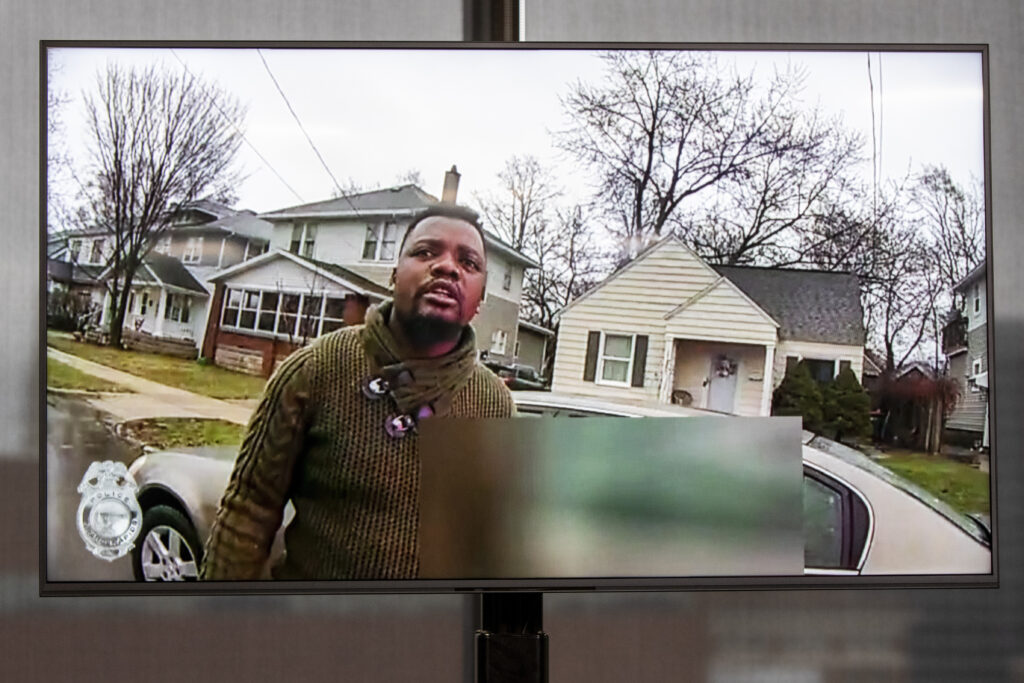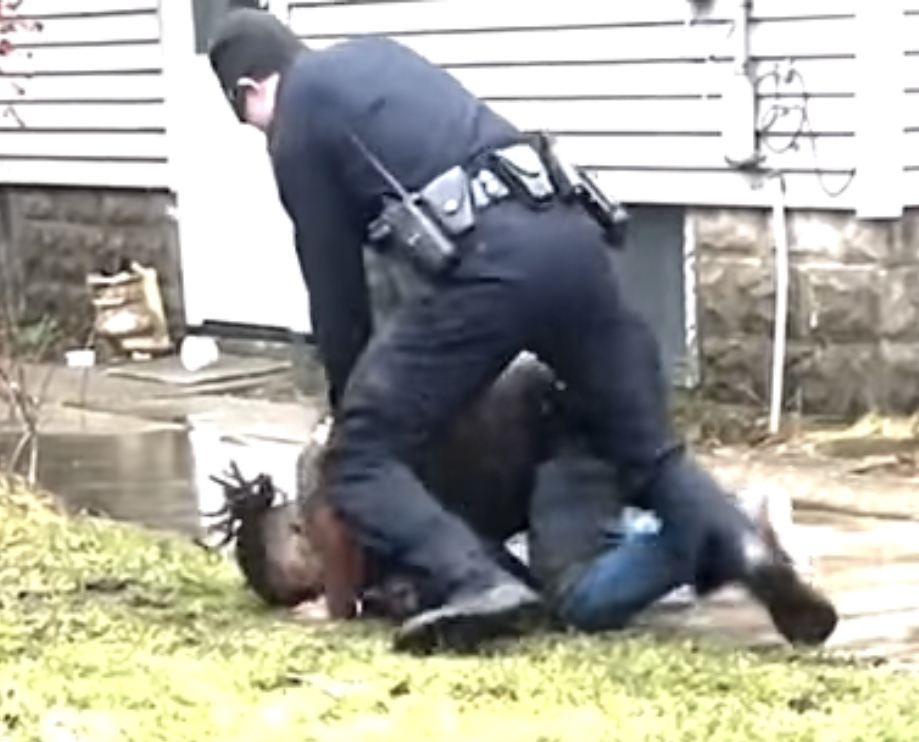Family, friends, local activists, and international supporters are continuing their demands for “Justice for Patrick Lyoya,” a refugee from the Democratic Republic of the Congo, shot in the head and killed by a White Grand Rapids police officer just over 10 months ago on the city’s Southeast side after allegedly stopping him for a minor traffic violation.
Devastating the Lyoya family, local African immigrants, and others of goodwill, activists within the city’s Black American community said video footage of the deadly encounter reminded them of a gangland execution of an unarmed Black man and expressed dismay over a January 24 motion to throw out the second-degree murder charge against former Grand Rapids Police Officer Christopher Schurr. The incident happened April 4, 2022,
According to The Washington Post, Kent County Prosecutor Chris Becker filed papers opposing a bid by Mr. Schurr’s attorney to dismiss the charge. “Becker said in court documents filed Tuesday that the district court did not abuse its discretion in finding probable cause to bind Schurr over on the charge,” the January 26 Post article said. “Kent County Circuit Judge Christina Elmore will hear both sides’ arguments during a motion hearing scheduled for 8:30 a.m. (Eastern time) Feb. 2. The case currently is set to go to trial March 13,” the article continued.

Lyoya family confidant and interpreter, Israel Siku, said Patrick’s parents primarily speak Swahili and French, and told The Final Call that Patrick’s immediate family, extended family, and friends in the Democratic Republic of the Congo (DRC), one of the world’s greatest suppliers of minerals, precious, and strategic metals, all remain in shock. He explained that many worry for their own families’ and friends’ safety in America, particularly since the heinous and internationally televised 2020 murder of George Floyd by a Minnesota police officer.
“The family, especially the father and the mom, all of them are affected, but the person affected the most is the father because Patrick was like a friend to him,” Mr. Siku said in a telephone interview. “So, anytime now, when you talk to him, you can feel that grief in him that is still mourning his son, he is really hurt,” Mr. Siku said of Peter and Dorcas Lyoya’s loss of their first-born son.
Mr. Siku said Patrick’s father, who fled with his family from war in the Congo, came to America believing he and his family would be safe in Grand Rapids and said protests should be peaceful, adding that violence and property damage only play into the hands of detractors who want to deflect attention away from their legitimate demands for justice. Renowned attorney Benjamin Crump is representing the Lyoya family.
Mr. Siku praised the advocacy of Kent County Commissioner Robert S. Womack, who he said sacrificed his political office to help the Lyoya family. He said their case would have been swept under the rug and ignored were it not for Mr. Womack’s work on their behalf. “Every time I speak with Mr. Lyoya, the only thing he is seeking is justice, true justice, and he would like to see African leaders, and Blacks, involved to defend and to protect the lives of young African Americans in this country,” Mr. Siku added.
According to justice advocates in Grand Rapids, many in the African immigrant community are becoming increasingly aware of the 400-plus-year history of American anti-Black racism, the legacy of chattel enslavement often hidden from history books, and how discrimination toward Black people is a major issue in the United States. Many added that relationships between non-Black institutions facilitating African emigration, particularly to their city, have too often discouraged unity between African immigrants and Black Americans of the diaspora.

Jewellynne Richardson is affectionately known on the city’s Southeast side as “Mama Jewel,” and is a member of West Michigan Jewels of Africa (WMJOA), a group designed to build relationships between African immigrant families and Black Americans. She told The Final Call that the brutal killing of Patrick Lyoya has sparked a movement, which has awakened many to the hidden realities facing Black people in a city that on one hand pays lip service to progress, diversity, and inclusivity while suppressing Black advancement and self-determination with the other.
“It has been devastating yet it’s one of the keys that (got) us to unite in the Grand Rapids community and beyond,” Ms. Richardson said of Patrick Lyoya’s April 4 killing, which happened 54 years to the date of the Rev. Dr. Martin Luther King Jr.’s assassination in Memphis, Tennessee. “This incident made it very clear that when you come into America, you are now ‘Black,’ and for this incident, that has forced us to become united. We’ve taken the lemons that they’ve given us, it’s sour, it’s bitter, we want to spit it out, but we’re making lemonade by joining together and understanding that we have one focus and that is to be united worldwide as a group of Black people,” she explained.
“We have conversations, native African and African Americans, to come to a resolution (of) how we can support, what we have to do, to become one united people. This bad situation has been a boost to ignite change,” Ms. Richardson added. “They’re saying boldly now that they are Congo, they are Nigerian, they are Kenyan, but here in the United States, they understand they are Black and must unite with the Black people.”
Government violence as a tool of oppression
In his groundbreaking 1965 book, “Message to the Blackman in America,” the Eternal Leader of the Nation of Islam, the Most Honorable Elijah Muhammad, pointed out how police forces have been used as a tool of power and control over Black people in the United States. Using examples of the killing and maiming of his followers, he asked rhetorically, on page 211, whether Muslims were framed to whitewash the guilty?
“You may know of the incident that took place on April 27, 1962, in Los Angeles, California, between the Los Angeles policemen and my followers,” Mr. Muhammad wrote, citing a litany of instances of police violence toward unarmed Muslims who were killed, beaten, and harassed between 1934 and the time of the book’s publishing.
“One of my followers, Ronald T. X. Stokes was killed outright while his hands were raised and with nothing on him to do anyone harm. For 32 years, I have been trying to teach my people, the so-called American Negroes, the way of peace, and I have a record just that long in trying to live in peace with our open enemies. I have even warned my followers never to be the aggressors, as the religion of Islam teaches us that we cannot teach peace and then be the first to break peace with carnal weapons. I know who the fight belongs to. It belongs to Allah (God),” Messenger Muhammad said on page 212.
Grand Rapids Student Minister, Sultan Z. Muhammad, of the Nation of Islam’s Muhammad Mosque No. 61, under the leadership of the Honorable Minister Louis Farrakhan, said the issue of police violence toward Black people has been an ongoing problem in his city and he expressed solidarity with the Lyoya family on behalf of the local Believers.
“On the streets, a lot of the sentiment from the people in the community is a sense that the killing of Patrick Lyoya is being ‘quieted down’ so that they can ultimately dismiss the case and to prepare people for disappointment,” said Student Minister Muhammad.
“The prevailing Black leadership in the city, with the exception of Robert Womack and his strength in speaking out on that particular case, I believe fear causes them to be silent when we should be lifting up our voice,” Student Minister Muhammad said. “While there are strong voices in our community, we are only as strong as we are united.”












